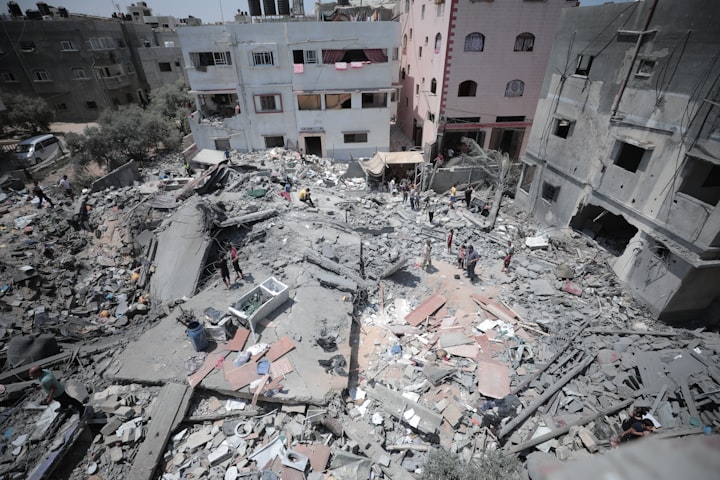Gaza authorities say 700 Palestinians have been killed in Israeli attacks.
Gaza authorities report that 700 Palestinians lost their lives during the Israeli airstrikes that took place overnight, leading to a growing demand for assistance to support the affected civilian population.

Latest DEVELOPMENTS: UN humanitarian agencies are urgently appealing for Gaza aid to be allowed in unimpeded. Doctors in Gaza are reporting that patients arriving at hospitals are displaying signs of disease resulting from overcrowding and poor sanitation, which have become prevalent after over 1.4 million people were forced to flee their homes to escape the Israeli bombardment.
After spending two weeks trapped in the Hamas tunnels in Gaza, an 85-year-old Israeli hostage who was recently freed described the experience as hellish. The situation in Gaza remains dire, as the Hamas-run health ministry reported that overnight Israeli air strikes resulted in the deaths of over 700 Palestinians, marking the highest 24-hour death toll since the "total siege" began two weeks ago. The pressure for allowing unimpeded aid into the enclave continues to grow.
The Israeli military has claimed to have targeted over 400 Hamas militant sites and killed several fighters in the latest round of air strikes. However, they acknowledge that it will take time to fully eradicate Gaza's ruling Islamist group, which had shocked Israel with its deadly cross-border attack on October 7.
Emmanuel Macron, the President of France, has traveled to Israel to offer support, stating that France stands "shoulder to shoulder" with Israel in its conflict with Hamas. However, he emphasized the importance of adhering to rules during the conflict. Israeli Prime Minister Benjamin Netanyahu assured that the country would strive to protect civilians and ensure that they no longer suffer under the rule of Hamas.
United Nations agencies are desperately pleading for emergency aid to be allowed into Gaza, calling for more than 20 times the current deliveries to adequately support the Palestinian population, which has endured two weeks of relentless Israeli bombardment. The World Health Organization has joined in the appeals and has requested an immediate humanitarian ceasefire to facilitate safe delivery of aid.
The situation in Gaza remains bleak, with doctors reporting that the influx of people seeking shelter due to the heavy bombardment has led to overcrowding and unsanitary conditions in temporary shelters. Tragically, at least 5,791 Palestinians, including 2,360 children, have been killed by Israeli airstrikes since October 7. In the past 24 hours alone, 704 deaths were recorded, representing the highest daily toll since the start of the Israeli bombing campaign.
The ongoing conflict shows no signs of abating, as Israeli tanks and troops amass on the border, preparing for a potential ground invasion. However, concerns about the welfare of hostages and the presence of heavily armed militants interconnected through a vast tunnel network complicate the situation.
The Israeli bombardments were triggered by a cross-border assault by Hamas into southern Israel, during which gunmen killed ove
More than 40 medical centers have ceased operations due to either fuel shortages or damage caused by Israeli airstrikes, according to the spokesperson for the health ministry.
The timing of a potential full-scale invasion of Gaza by Israel remains uncertain. Israel, possessing the most powerful military in the Middle East, is confronting a group that has amassed a substantial arsenal with assistance from Iran.
Concerns among global powers center on the possibility of the conflict spreading throughout the entire region. While affirming Israel's right to self-defense, some have called for restraint from the country.
The outcome of the situation is ambiguous. The prospect of Palestinians attaining an independent state in the territories occupied by Israel was already remote, and peace talks are a distant memory. In the meantime, Israel's right-wing government continues to expand Jewish settlements in the West Bank.
The deadly confrontations between the Israeli military and Palestinians in the West Bank have intensified, as have the clashes between Israel and Hezbollah, an Iran-backed group based in Lebanon, along the volatile border between the two countries.
The concern of regional escalation revolves around Iran's network of proxies in Syria, Iraq, and Yemen. A broader conflagration would endanger security in a region crucial for global energy supplies.
Amid mounting concerns about potential attacks by Iran-backed groups, U.S. officials have informed Reuters that the U.S. military is implementing new measures to safeguard its forces in the Middle East. Furthermore, contingency plans for the evacuation of military families are being considered.
Reporting by Nidal al-Mughrabi in Gaza and Ari Rabinovitch in Jerusalem, with additional contributions from Matt Spetalnick, Steve Holland, Rami Ayyub, and Humeyra Pamuk in Washington; Dan Williams and Emily Rose in Jerusalem; and Moaz Abd-Alaziz in Cairo. Written by Michael Perry, Angus MacSwan, and Mark Heinrich; edited by Miral Fahmy, Toby Chopra, Philippa Fletcher.
About the Creator
harunur roshid
I am harun so exitet Vocal site. I love to earn online.






Comments
There are no comments for this story
Be the first to respond and start the conversation.